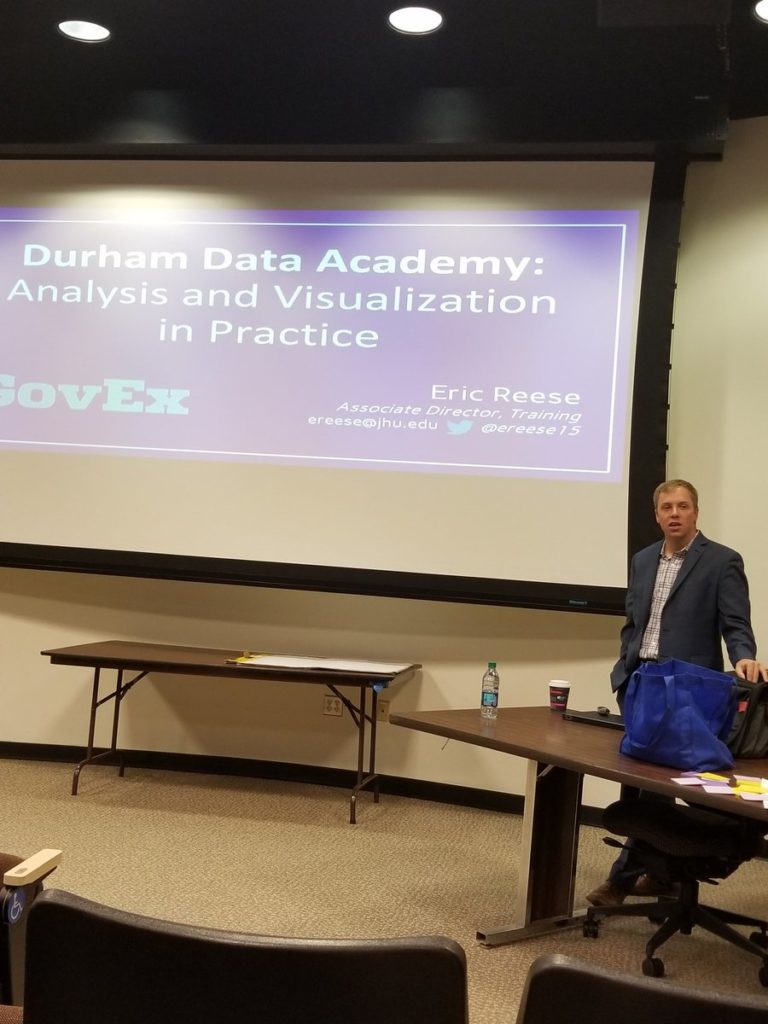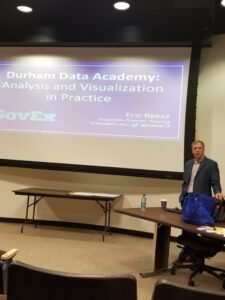
By: Eric Reese
Data can be powerful. But to really harness your data, you need people skilled in analysis, data management, and data-informed decision-making. Many cities are taking that lesson to heart and launching their own data academies to help employees learn to use data better. However, without careful planning and execution, your data academy may not get the results you hope for.
I spent the last two months traveling around the country helping several cities plan and kickoff their own academies. Each city had unique needs but there were also common themes across the cities as we planned and launched each academy. Broadly, all the cities wanted to start to shift their culture to be more data-oriented across the organization. All cities also wanted to start by engaging staff who were already interested in learning more about data to build champions within city government.
If you’re thinking about running your own data academy, here are a few tips to keep in mind.

Eric Reese kicks off Durham’s data academy
1. Define your core audience
To maximize the impact of training, you need to clearly define who you want to train and what you want them to take away from data training. Without a clear sense of benefit for attendees, your academy may quickly lose momentum.
2. Plan around your organizational needs and priorities
Starting with a particular issue in the organization can help you get started and provide immediate benefit both to participants and the organization as a whole. If your organization needs more technical skills in analysis, focus on that. If you are focused on customer service, train on how data can help improve that priority area.
3. Pay attention to the little things
Make sure your location is right for the topic (if you expect people do to do analysis, they will need computers). Help the participants get to know each other to build longer term relationships. Think about how much time participants can really commit. Keeping these small items in mind will help ensure your training is providing value to participants.
To learn more, check out the takeaways and key lessons learned our city partners outlined below. You can also find information on our new Let’s Start a Data Academy Worksheet. The worksheet is designed to help anyone considering launching their own academy think through some basic structural questions to set up the academy for success. And of course you can always get in touch with us at [email protected] if you’re interested in more hands-on assistance with launching your data academy.
City Academy Takeaways
Boise, ID. Training Lead – Kyle Patterson
- What was the biggest reason you wanted to start a data academy? We knew we couldn’t achieve our goals as a city without better leveraging data to improve and inform, and we believed staff don’t have to be data scientists or coders to do analytics that add value to the organization. I love that our Data Stewards program (group of staff across all departments focused on data management) fosters a cross-departmental community of data users who will learn from each other and develop a citywide perspective on data.
- What was the biggest takeaway from the initial session? We have an abundance of smart, driven staff who are hungry and excited to use data, but they don’t always know how or where to start. I was surprised at the extent to which the training activated those staff as data evangelists in their respective departments. Also, there was a real benefit to including staff with diverse backgrounds and jobs – not just analysts. Everybody had something different and valuable to offer to the group. For example, we had communications and engagement staff attend who offered great insights on presenting data effectively.
Denton, TX. Training Leads – Melissa Kraft and Charlie Rosendahl
- What was the biggest reason you wanted to do a data academy? The City of Denton has been making a large push towards performance management and data driven decision making. It was necessary to train our analyst staff to better utilize data to tell the story of their department and assist the executive staff in decision making.
- What was the biggest takeaway from the initial session? The session from GovEx was great and really sparked an interest from our staff. We received good feedback from everyone that attended and the group has planned to continue meeting up to further their learning experience.
Greensboro, NC. Training Lead – Jason Marshall
- What was the biggest reason you wanted to do a data academy? I see a lot of value in providing opportunities to increase our organization’s data literacy, and analytic skills. As we move towards using our data more effectively and efficiently for decision making on policy, and programs, a robust data academy curriculum crafted for the needs of our staff, will provide the skills and knowledge needed to be successful.
- What was the biggest takeaway from the initial session? I was impressed by the enthusiasm of the attendees at the initial session! This was a clear indication to me that there is an interest from staff for ongoing data related training options related to statistics and analytical tools. I also see this as an opportunity to encourage discussion, and build a stronger network of staff across departments to assist with breaking down data silos.
Originally published 12/19/17

